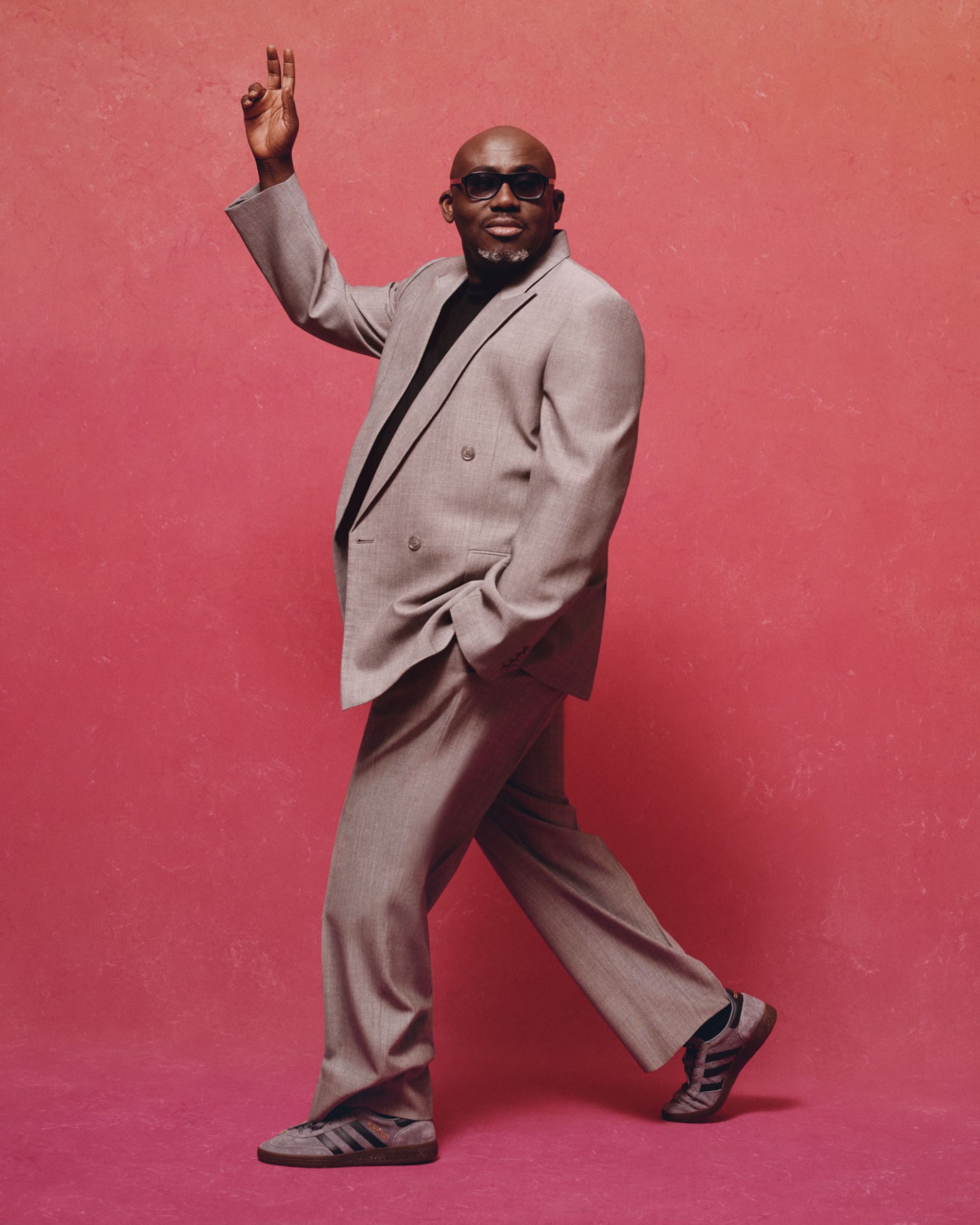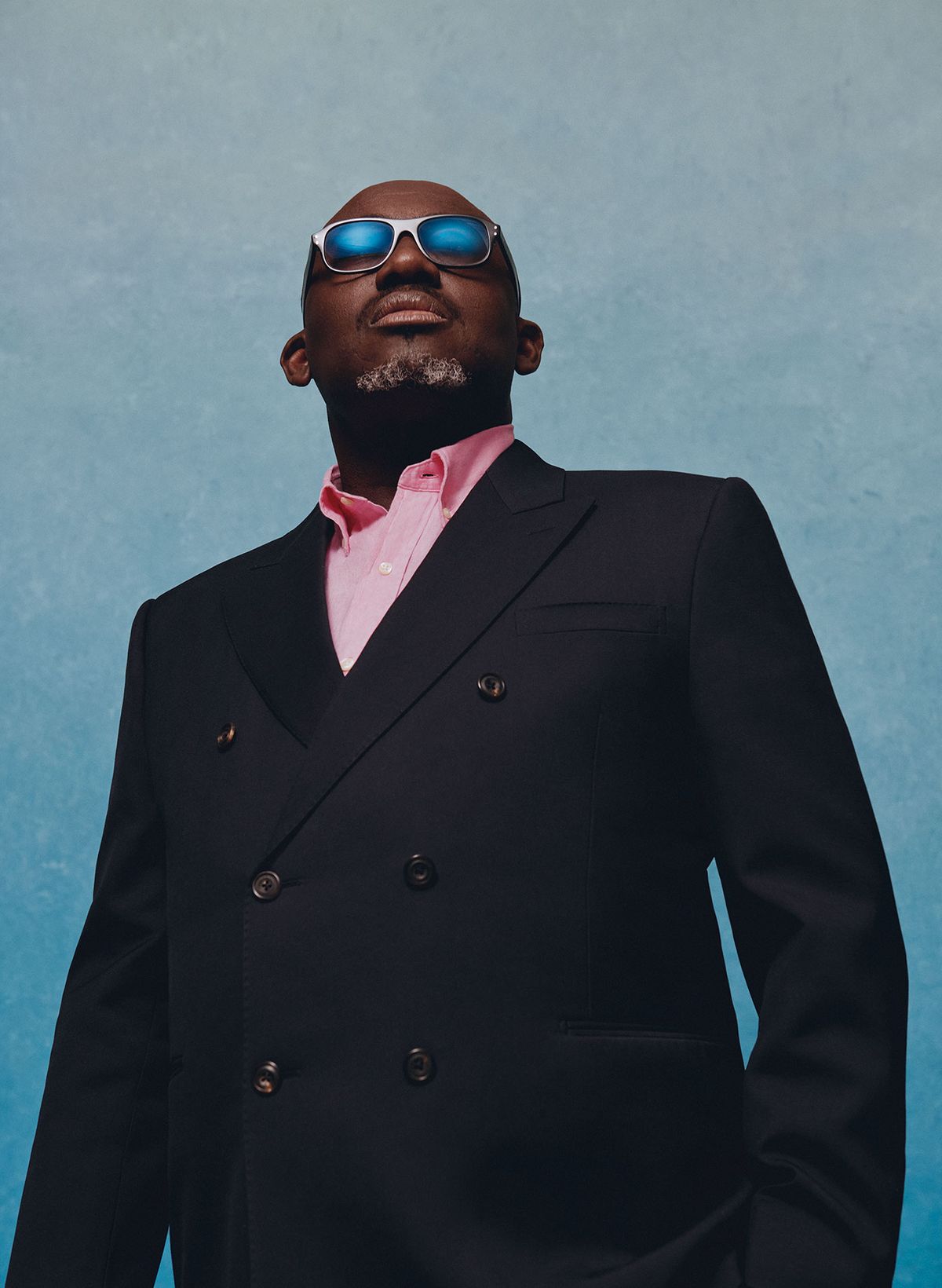Edward Enninful is one of the great minds of our time. With an insatiable thirst for knowledge and a penchant for asking “why?”, creativity perpetually flows through his veins. He finds the utmost fulfilment when knee-deep in research, immersing himself in various forms of culture, especially art. Enninful seeks to understand “the mechanics of things” and studies “the masters and their brush strokes”, among other subjects. While his career has transported him to the far corners of the globe for fashion, he is admittedly “as excited about going to galleries as I am about seeing the [designer] shows”. Art is crucial to his quality of life, for it allows him to pause and see the world in a different way. Thus, it is apropos that for Enninful’s next chapter, he turns his creative eye toward the art world.
It is a brisk, overcast winter morning in London as we cradle our steaming coffees. The contrast is palpable with the warmth and “kaleidoscope” colours he describes in his mother’s Ghanaian clothing atelier. These vibrant, contrasting hues of his childhood are integral to his philosophy that anything is possible, for fashion is “almost like a canvas where everything goes”. As a young boy, he was always feverishly sketching his ideas onto paper. “I was obsessed with drawing. I would draw women day and night. I was drawing Naomi [Campbell] before I even met her.” He describes these early years as a visual feast that set his imagination on fire, and it instilled in him the core tenet that “the eye must travel”.
Enninful’s hunger for information hit a fever pitch when he emigrated to Britain as a teenager and began devouring magazines. In a moment of intervening fate, 16-year-old Enninful was discovered by stylist Simon Foxton on the London tube, subsequently propelling him into the world of fashion - first as a model, then stylist, and, by the age of 18, as an editor of i-D magazine. “I met Juergen Teller. I met Venetia Scott. Nick Knight. I just remember that my brain couldn’t even handle it. I couldn’t sleep. I was up every day and so excited. And I still have that excitement. It really came from my youth.”

Edward Enninful wears a suit by Phoebe Philo bespoke; T-shirt by American Vintage; trainers by Adidas; glasses by Cutler and Gross Photography by Nadine Ijewere; stylist Susan Bender Whitfield; stylist assistant Talitha Howden; makeup by Joshua Duncan; grooming by Ian Hoyos at Champs Barbers
With his first taste of the creative industry, Enninful was hooked. He was at home in a world where fashion and art were prevalent. “I’m always inspired by what I see. i-D was about what was happening on the streets. What are young people wearing? To be a young person creating a magazine for other young people was amazing. Musicians, actors, painters, that’s what i-D is. And for me, I’ve always carried that ethos. It’s almost like punk rock.” Reflecting on times of creative liberation, he fondly remembers working with Franca Sozzani at Vogue Italia, who he refers to as “one of the greatest editors of our time”. Sozzani and Enninful shared an ethos for an artist-led, multi-disciplinary approach to storytelling. He continues, “Italian Vogue became the most artistic because you had 30 pages of stories based on the work of an artist. Italian Vogue was really the most influential fashion magazine of the 90s. I’d go to her with my kooky ideas, and she would commission eight stories. I think she was just amused by me. There was always so much in my head that I would just pull it out and she would edit, saying, ‘OK, let’s do this, let’s do that’.”
Enninful is best known for his illustrious career in fashion, and yet he has lived a life equally punctuated by art. Growing up in London at the height of the YBAs [Young British Artists] excitement, he was at the centre of it all. “Brit art was happening. White Cube was happening. Jay Jopling. Tracey Emin. Since London was so small, we went everywhere together. I became so aware of the art scene. It was all about my generation of artists. So, we just took that knowledge, and it informed the work we did.” This pivotal period left a lasting impact on his editorial choices, in turn shaping the future of fashion. When he landed the top role at British Vogue, he continued to champion artists and writers, thereafter leaving an indelible mark on the industry. When asked which artists he gravitates towards today, “I love Black art. I love David Hammons, Wangechi [Mutu], Lynette Yiadom-Boakye. I love the young artists. I like how women’s art is coming to the fore. I like how Black art is really being celebrated now. I’ve always liked artists who have an original point of view. Always themselves. Never follow fads.” Enninful’s commitment to authenticity also permeates his approach to collecting. “I can’t have anything in my home because it is the coolest thing to have when I have no personal relation. I just collect for pleasure.” Incidentally, he has a beautiful collection of photography by his peers, including Steven Meisel, Juergen Teller and Steven Klein.
It is fitting that, after years of orchestrating editorial shoots, Enninful has curated a Robert Mapplethorpe photography exhibition for Thaddaeus Ropac in Paris. True to his nature, Enninful meticulously studied over 4,000 images by the artist. He set out to illuminate a different side of Mapplethorpe’s work by evoking “some tension”. As a result, he is presenting the artist’s photography either in harmony or juxtaposition. How does he determine when the pairings are perfect? There’s a moment, he says, when he gets a head rush and a sense of euphoria, signalling that a presentation feels right. With his infectious enthusiasm, Enninful adds, “It’s amazing to be in a world I’ve admired for so long. The world I’ve been a part of, as a participant in a way. It’s a dream come true, really.” He also hints at forthcoming collaborations with museums.
Edward Enninful has led a bold, colourful life, always asking himself, “How can I bring something to the system that makes people question what they know?” Having reshaped the narrative in fashion, his shift to the art realm is met with great anticipation. Ultimately, Enninful’s unique fusion of punk spirit and an unyielding commitment to nurturing beauty marks him as one of the foremost innovators of our era.
All material © Show Media Ltd


